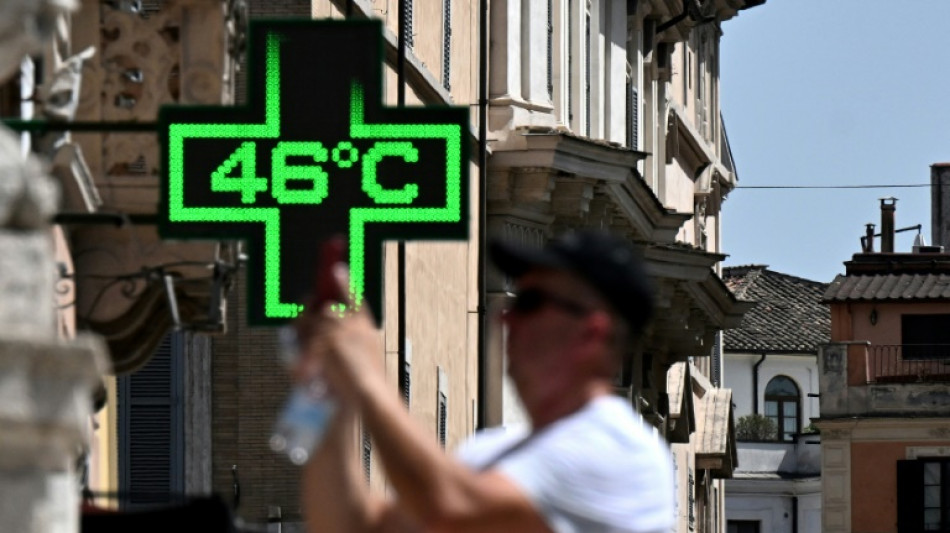
-
 Scotland spoil Italy's T20 World Cup debut with big win
Scotland spoil Italy's T20 World Cup debut with big win
-
Israeli president says 'we will overcome evil' at Bondi Beach

-
 Munsey leads Scotland to 207-4 against Italy at T20 World Cup
Munsey leads Scotland to 207-4 against Italy at T20 World Cup
-
Japan restarts world's biggest nuclear plant again

-
 Bangladesh poll rivals rally on final day of campaign
Bangladesh poll rivals rally on final day of campaign
-
Third impeachment case filed against Philippine VP Duterte

-
 Wallaby winger Nawaqanitawase heads to Japan
Wallaby winger Nawaqanitawase heads to Japan
-
Thailand's Anutin rides wave of nationalism to election victory

-
 Venezuela's Machado says ally kidnapped by armed men after his release
Venezuela's Machado says ally kidnapped by armed men after his release
-
Maye longs for do-over as record Super Bowl bid ends in misery

-
 Seahawks' Walker rushes to Super Bowl MVP honors
Seahawks' Walker rushes to Super Bowl MVP honors
-
Darnold basks in 'special journey' to Super Bowl glory

-
 Japan's Takaichi may struggle to soothe voters and markets
Japan's Takaichi may struggle to soothe voters and markets
-
Seahawks soar to Super Bowl win over Patriots

-
 'Want to go home': Indonesian crew abandoned off Africa demand wages
'Want to go home': Indonesian crew abandoned off Africa demand wages
-
Asian stocks track Wall St rally as Tokyo hits record on Takaichi win

-
 Bad Bunny celebrates Puerto Rico in joyous Super Bowl halftime show
Bad Bunny celebrates Puerto Rico in joyous Super Bowl halftime show
-
Three prominent opposition figures released in Venezuela

-
 Israeli president says 'we shall overcome this evil' at Bondi Beach
Israeli president says 'we shall overcome this evil' at Bondi Beach
-
'Flood' of disinformation ahead of Bangladesh election

-
 Arguments to begin in key US social media addiction trial
Arguments to begin in key US social media addiction trial
-
Dr. Jonathan Spages Expands Diabetes Reversal Practice Across New States, Adds Clinical Team to Meet Growing Demand

-
 Agronomics Limited Announces Net Asset Value Calculation as at 31 December 2025
Agronomics Limited Announces Net Asset Value Calculation as at 31 December 2025
-
UK-Based Vesalic Limited Emerges from Stealth with Landmark Discovery of Potential Non-CNS Driver of Motor Neuron Diseases, including ALS, and Breakthrough Therapeutic and Diagnostic Opportunities

-
 Gotterup tops Matsuyama in playoff to win Phoenix Open
Gotterup tops Matsuyama in playoff to win Phoenix Open
-
New Zealand's Christchurch mosque killer appeals conviction

-
 Leonard's 41 leads Clippers over T-Wolves, Knicks cruise
Leonard's 41 leads Clippers over T-Wolves, Knicks cruise
-
Trump says China's Xi to visit US 'toward the end of the year'

-
 Real Madrid edge Valencia to stay on Barca's tail, Atletico slump
Real Madrid edge Valencia to stay on Barca's tail, Atletico slump
-
Malinin keeps USA golden in Olympic figure skating team event

-
 Lebanon building collapse toll rises to 9: civil defence
Lebanon building collapse toll rises to 9: civil defence
-
Real Madrid keep pressure on Barca with tight win at Valencia

-
 PSG trounce Marseille to move back top of Ligue 1
PSG trounce Marseille to move back top of Ligue 1
-
Hong Kong to sentence media mogul Jimmy Lai in national security trial

-
 Lillard will try to match record with third NBA 3-Point title
Lillard will try to match record with third NBA 3-Point title
-
Vonn breaks leg as crashes out in brutal end to Olympic dream

-
 Malinin enters the fray as Japan lead USA in Olympics team skating
Malinin enters the fray as Japan lead USA in Olympics team skating
-
Thailand's Anutin readies for coalition talks after election win

-
 Fans arrive for Patriots-Seahawks Super Bowl as politics swirl
Fans arrive for Patriots-Seahawks Super Bowl as politics swirl
-
'Send Help' repeats as N.America box office champ

-
 Japan close gap on USA in Winter Olympics team skating event
Japan close gap on USA in Winter Olympics team skating event
-
Liverpool improvement not reflected in results, says Slot

-
 Japan PM Takaichi basks in election triumph
Japan PM Takaichi basks in election triumph
-
Machado's close ally released in Venezuela

-
 Dimarco helps Inter to eight-point lead in Serie A
Dimarco helps Inter to eight-point lead in Serie A
-
Man City 'needed' to beat Liverpool to keep title race alive: Silva

-
 Czech snowboarder Maderova lands shock Olympic parallel giant slalom win
Czech snowboarder Maderova lands shock Olympic parallel giant slalom win
-
Man City fight back to end Anfield hoodoo and reel in Arsenal

-
 Diaz treble helps Bayern crush Hoffenheim and go six clear
Diaz treble helps Bayern crush Hoffenheim and go six clear
-
US astronaut to take her 3-year-old's cuddly rabbit into space


Summer 2023 was the hottest in 2,000 years: study
Last year's northern hemisphere summer was the hottest in 2,000 years, according to a new study published on Tuesday.
Scientists say 2023 was the hottest year globally since records began in 1850, but the study in the journal Nature indicates human-caused climate change pushed northern summer highs well beyond anything seen in two millennia.
"We shouldn't be surprised," the study's lead author Jan Esper told AFP.
"For me it's just the continuation of what we started by releasing greenhouse gases" that cause global warming, said Esper, a professor of climatology at Germany's Johannes Gutenberg University.
Scientists used tree-ring data from sites across the northern hemisphere to estimate global temperatures between the first century AD and 1850, before the advent of modern observational instruments.
The conservative estimate found that 2023 was at least 0.5 degrees Celsius hotter than the warmest northern hemisphere summer of that period in AD246.
Otherwise, it was 1.19 degrees warmer.
Study co-author Max Torbenson told reporters that 25 of the last 28 years exceeded the summer highs of AD246 -- the hottest year before modern temperature records began.
By contrast the coolest summer of that 2,000-year period was nearly four degrees below 2023 summer temperatures in the northern hemisphere due to a major volcanic eruption.
Scientists say volcanic activity could bring about cooler conditions in future as they did in the past, but that ultimately humanity's release of greenhouse gases would keep trapping heat in the atmosphere.
In 1992, an eruption the previous year helped soften the impact of the El Nino weather system, which warms the Pacific Ocean and can bring hotter global conditions.
After the effect subsided, temperatures soared in 1998, which the study noted was one of the warmest summers after 2023 and 2016 respectively -- both also El Nino years.
Esper said the only way to curb rising temperatures was to immediately start cutting emissions and "the longer we wait, the more difficult and expensive it will be".
- Health risks -
A separate study published on Tuesday warned that higher temperatures and ageing populations would see tens of millions of older people being exposed to dangerous heat extremes by 2050.
Already 14 percent of elderly people are exposed to days exceeding 37.5 degrees, which can aggravate health conditions and even lead to death, said the study in the journal Nature Communications.
That number is expected to climb to 23 percent by the middle of the century, the study said.
"Different countries in the world are facing similar issues... but the level of preparedness, the adaptive capacity of people and of society is different," the study's lead author Giacomo Falchetta told AFP.
Europe has systems in place to support people during heatwaves but faces considerable change as one of the fastest warming regions on Earth, said Falchetta of the Euro-Mediterranean Center on Climate Change.
The share of elderly people in Africa and Asia is set to grow dramatically though populations in poorer regions lack access to sufficient clean water or healthcare to cope with heat extremes, Falchetta said.
"It raises questions of inequality around the world in terms of how governments and regions are equipped to cope with this," he said.
While 2050 appears far off, Falchetta said people as young as 40 today would be among those vulnerable to future heatwaves.
Ageing populations cannot be avoided but "reducing emissions can really reduce to some extent the heat exposure that will be felt", he said.
F.Schneider--AMWN


